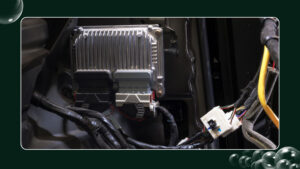
5 Causes of Engine ECU Failure (Why does the ECM fail?)
The ECU is your vehicle’s engine control unit. Also called the PCM (Powertrain Control Module) or ECM (Engine Control Module).
This electronic module is the built-in computer that your vehicle relies on to manage its various systems and functions. Think of it as the brains of your car. The things that rely most on the ECU are the engine and drivetrain. The ECU can send data feedback to the engine through various electronic sensors, chips, and components in the vehicle. The nature of this feedback determines what function the motor will perform next.
This is very helpful in calculating the appropriate amount of air and fuel required for the combustion process.
Common Reasons for ECU Problems
The ECU controls almost every major system and function in the vehicle. If your ECU is faulty, there will be many noticeable symptoms. It won’t take long for you to realize that the ECU is to blame.
There are many internal causes that can contribute to this. Below are the 5 most common causes of ECU failure: If you notice a problem with your ECU, have it checked immediately.
1) Dead Battery
Your car battery has electronic cells that need to work for the ECU to work. If one of the cells in your car battery dies, your ECU will fail immediately.
You won’t even be able to start your car and start the engine.
2) Corrosion
The ECU is surrounded by seals designed to keep moisture out. If the seals get too worn, it becomes easier for moisture to get past them and into the ECU.
Moisture is bad for you inside the ECU, as it can cause corrosion on components. If the corrosion is not removed immediately, it will damage these components, which will cause the ECU to fail.
3) Low Voltage
There are wires that go into the ECU wiring harness that allow you to check the voltage level.
Just hook up a voltmeter. This device can determine how much voltage is going to the ECU. If the voltage is below 6, the ECU may have a problem.
4) Bad Jump Starting
If you try to start the vehicle without connecting the wires properly, the voltage may spike and short out the ECU.
5) Bad Starter
Many vehicles have a starter motor with its own sensors. One of these sensors is the override sensor, which controls how many voltages the ECU receives.
If this sensor is faulty, the ECU will not receive the correct voltage.

